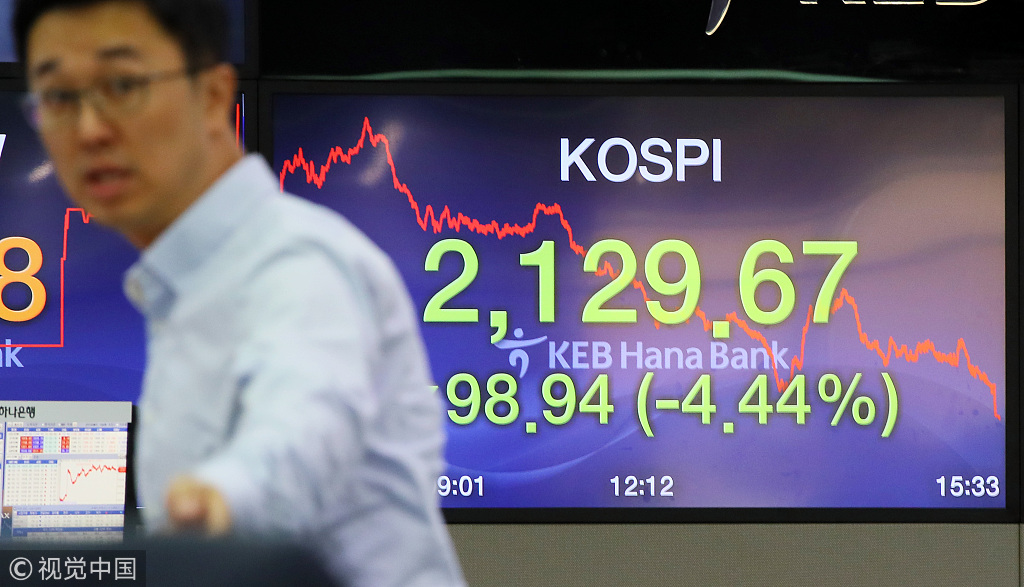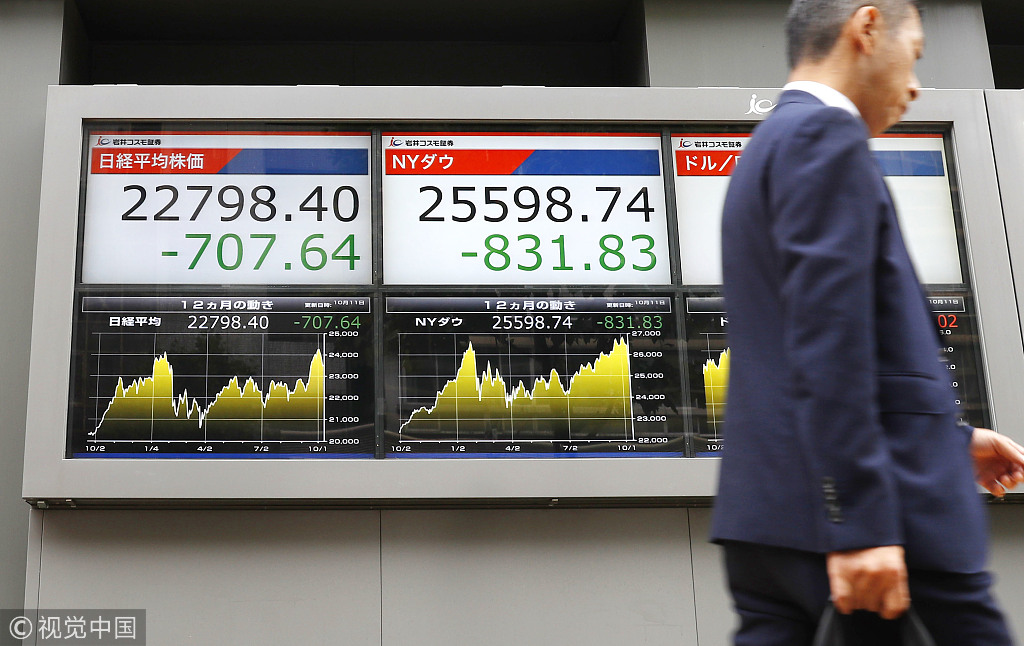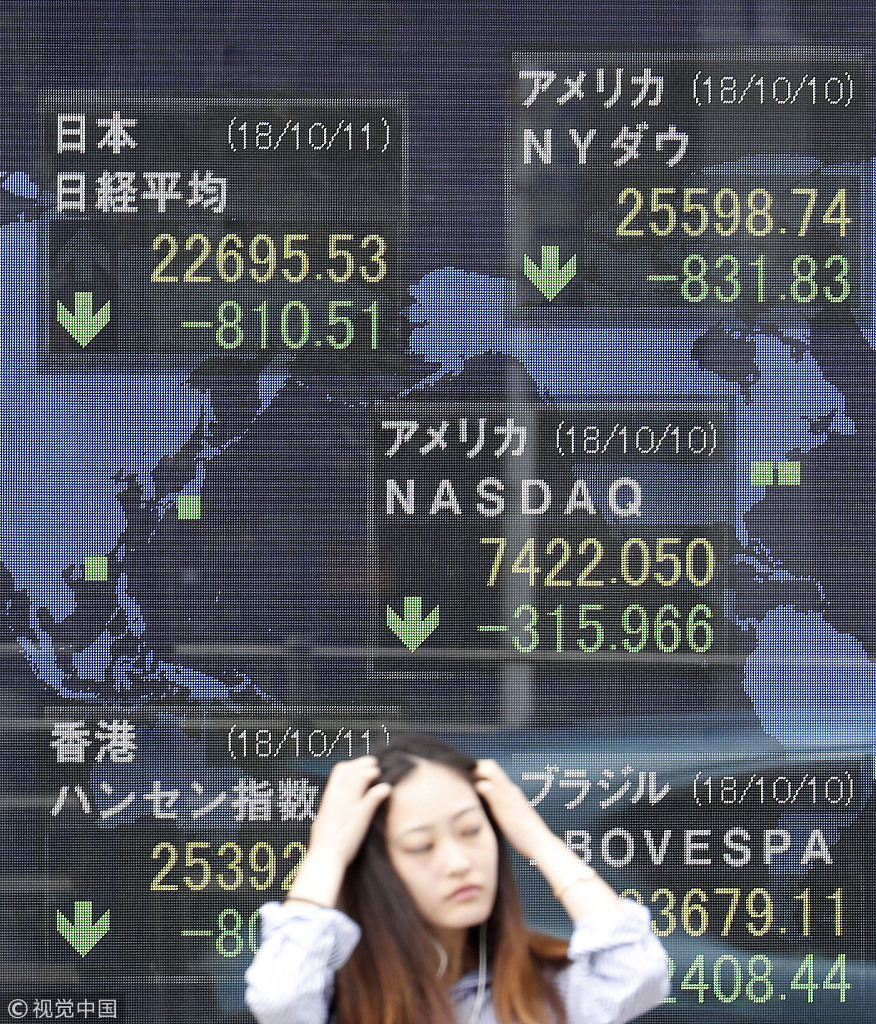Asia stocks are crumbling on Thursday with Shanghai, Shenzhen and Tokyo all falling more than 4%, and experts believe that the sharp declines reflect the people’s concerns over the global trade war and US Fed interest rate hikes.

Photos: VCG
Jiang Han, a research fellow at Suning Financial Research Institute, told the People’s Daily on Thursday that above all the US federal reserve continues to raise interest rates with no end in sight. Such excessive moves are no good for US stocks and other major stock indexes around the world.
Even though the Fed’s decision on interest hikes is still making sense to the US economy, the global market is seeing it as a big disaster, especially emerging markets, Jiang continued.
Hong Kong's Hang Seng index was down 3.51 percent. Over on the mainland, the Shanghai composite and the Shenzhen composite both opened the day with declines exceeding 3 percent.
The emerging economies have been hammered due to the Fed’s rate hike recently. When other countries face problems, the US will find equal difficulty to protect its own market, Jiang noted.
Both the Dow and S&P 500 posted their biggest one-day drops since early February, while the Nasdaq notched its largest single day sell-off since June 24, 2016.
Asian stocks slumped in early trade as concerns about higher US interest rates and a global trade war prompted investors to sell, according to BBC on Thursday.

The US-provoked trade war with China will increase US inflation through the addition of tariffs. It will also have an adverse impact on US economic growth in the medium and long term, according to business insiders.
The US labor market is fully employed, the unemployment rate has fallen to a historical low of 3.7 percent, with wage growth accelerating at 2.9 percent, and these factors will offer strong support for an inflation rebound.
As of late morning, the Dow Jones industrial average futures pointed to an implied open of 335.74 points lower.
In Sydney, the ASX 200 fell 2.43 percent, with most sectors trading lower. The energy subindex was down 3.62 percent, materials were lower by 2.48 percent and the heavily weighted financial sector fell 2.38 percent.
Given European stock markets have generally fallen, when asked if the stock market will continue to decline, Financial commentator Yu Fenghui dismissed the possibility, saying it’s unlikely to trigger a global or regional financial crisis. From the perspective of US stocks, the callback will be more conducive to a solid foundation.
As the US employment data picks up, the direct cause is the continuous improvement of wage levels in the US, Jiang noted.
“For ordinary workers, it's good news, but it is tantamount to a rapid increase in costs for US companies,” Jiang said.
Take Amazon for example. The firm raised salaries this year, which has led to an increase in its costs. Wall Street doubts if Amazon can maintain a high market value in the fourth quarter. In terms of industry distribution, technology stocks, chip stocks, and auto stocks fell by a large margin. Chip companies are generally affected by the decline in orders, trade wars and uncertainties, and are subject to lower earnings forecasts. Automobile companies are affected by weak demand in major markets such as China, the US and Europe, business insiders said.

What to expect
Mid-term elections will take place in November. In this critical time, the Trump administration hopes that the US economy and the capital markets will continue to be supportive.
However, as mentioned above, the current stalemate in the US-China trade war has pushed up US inflation in the short term, which is not conducive to the US economy in the medium and long term. It will also suppress the stock market through various channels such as orders, profits, and interest rate hikes, and impact the capital markets.
This is the underlying reason why the US cannot really expand the fundamentals of tit-for-tat tariff trade war.


